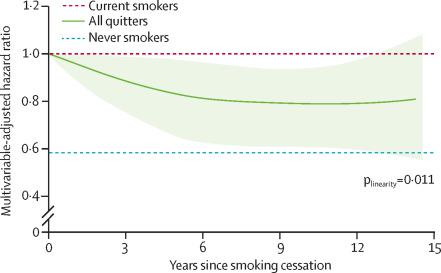当前位置:
X-MOL 学术
›
Lancet Diabetes Endocrinol.
›
论文详情
Our official English website, www.x-mol.net, welcomes your feedback! (Note: you will need to create a separate account there.)
Smoking cessation and weight change in relation to cardiovascular disease incidence and mortality in people with type 2 diabetes: a population-based cohort study.
The Lancet Diabetes & Endocrinology ( IF 44.5 ) Pub Date : 2020-01-07 , DOI: 10.1016/s2213-8587(19)30413-9 Gang Liu 1 , Yang Hu 2 , Geng Zong 3 , An Pan 4 , JoAnn E Manson 5 , Kathryn M Rexrode 6 , Eric B Rimm 7 , Frank B Hu 7 , Qi Sun 8
The Lancet Diabetes & Endocrinology ( IF 44.5 ) Pub Date : 2020-01-07 , DOI: 10.1016/s2213-8587(19)30413-9 Gang Liu 1 , Yang Hu 2 , Geng Zong 3 , An Pan 4 , JoAnn E Manson 5 , Kathryn M Rexrode 6 , Eric B Rimm 7 , Frank B Hu 7 , Qi Sun 8
Affiliation

|
BACKGROUND
To reduce their overall substantially increased risk of cardiovascular disease and premature mortality, smoking cessation is especially important for people with diabetes. However, the effect of weight change after quitting smoking on the long-term health consequences of smoking cessation is unclear. We aimed to examine smoking cessation and subsequent weight change in relation to incident cardiovascular disease events and mortality among adults with type 2 diabetes.
METHODS
In this population-based cohort study, we analysed data from people with type 2 diabetes from two prospective cohorts in the USA: the Nurses' Health Study (1976-2014) and the Health Professionals Follow-Up Study (1986-2014). We included participants from both cohorts who either had prevalent type 2 diabetes or were diagnosed during the study, and who were either current smokers or never smokers without cardiovascular disease or cancer at diagnosis of diabetes. Information on demographics, newly diagnosed diseases, medical history, and lifestyle factors, including smoking status and weight change, was updated every 2 years through validated questionnaires. We assessed the incidence of cardiovascular disease and all-cause and cause-specific mortality among recent quitters (within 6 years of stopping) and long-term quitters (>6 years) associated with weight change within 6 years of smoking cessation among people with type 2 diabetes. We did a multivariable-adjusted Cox proportional hazard models to estimate hazard ratios (HRs) for the associations of smoking cessation and weight change on the outcomes.
FINDINGS
Of 173 229 total cohort participants (121 700 from the Nurses' Health Study and 51 529 from the Health Professionals Follow-Up Study), 10 809 people with type 2 diabetes were included in the incident cardiovascular disease analysis and 9688 were included in the mortality analysis. 2580 incident cases of cardiovascular disease occurred during 153 166 person-years of follow-up, and 3827 deaths occurred during 152 811 person-years of follow-up. Recent quitters (2-6 consecutive years since smoking cessation) without weight gain within the first 6 years of quitting had a significantly lower risk of cardiovascular disease than people who continued to smoke (multivariable-adjusted HR 0·83 [95% CI 0·70-0·99] among all recent quitters, 0·77 [0·62-0·95] among recent quitters without weight gain, 0·99 [0·70-1·41] among recent quitters with weight gain of 0·1-5·0 kg, 0·89 [0·65-1·23] among recent quitters with weight gain of >5·0 kg, and 0·72 [0·61-0·84] among longer-term quitters [>6 consecutive years since smoking cessation]). Weight gain within 6 years after smoking cessation did not attenuate the inverse relation between long-term cessation and all-cause mortality (multivariable-adjusted HR 0·69 [95% CI 0·58-0·82] among long-term quitters without weight gain, 0·57 [0·45-0·71] among long-term quitters with weight gain of 0·1-5·0 kg, and 0·51 [0·42-0·62] among long-term quitters with weight gain of >5·0 kg), with similar results observed for cardiovascular disease and cancer mortality.
INTERPRETATION
Smoking cessation without subsequent weight gain is associated with a reduced risk of cardiovascular disease and mortality among smokers with type 2 diabetes. Weight gain after smoking cessation attenuates the reduction in risk of developing cardiovascular disease, but does not attenuate the beneficial effect of smoking cessation with respect to mortality. These findings confirm the overall health benefits of quitting smoking among people with type 2 diabetes, but also emphasise the importance of weight management after smoking cessation to maximise its health benefits.
FUNDING
US National Institutes of Health.
中文翻译:

2型糖尿病患者的戒烟和体重变化与心血管疾病的发生率及死亡率的关系:一项基于人群的队列研究。
背景技术为了减少他们总体上显着增加的心血管疾病和过早死亡的风险,戒烟对于糖尿病患者尤其重要。但是,戒烟后体重变化对戒烟的长期健康影响尚不清楚。我们的目标是检查与2型糖尿病成年人中心血管事件的突发事件和死亡率相关的戒烟和随后的体重变化。方法在这项基于人群的队列研究中,我们分析了来自美国两个前瞻性队列的2型糖尿病患者的数据:护士健康研究(1976-2014)和卫生专业人员随访研究(1986-2014)。我们纳入了来自两个队列的参与者,这些参与者患有2型糖尿病,或者在研究期间被诊断出,谁是目前吸烟者或从未吸烟者在诊断出糖尿病时没有心血管疾病或癌症。通过有效的问卷调查,每两年更新一次有关人口统计学,新诊断疾病,病史和生活方式因素的信息,包括吸烟状况和体重变化。我们评估了2型糖尿病患者最近戒烟(在戒烟6年之内)和长期戒烟(> 6岁)与体重变化相关的心血管疾病的发生率以及所有原因和特定原因的死亡率2糖尿病。我们进行了多变量调整的Cox比例风险模型,以评估戒烟与体重变化对结局的关联的风险比(HRs)。结果在173229名队列研究参与者中(121700名来自护士 健康研究和来自健康专业人士后续研究的51 529)中,将10 809名2型糖尿病患者纳入了心血管事件的突发事件分析中,并将9688人纳入了死亡率分析中。在153 166人-年的随访期间,发生了2580起心血管疾病的事件,在152 811人-年的随访期间发生了3827例死亡。最近的戒烟者(戒烟后连续2-6年)在戒烟的前6年内没有体重增加,其心血管疾病的风险显着低于继续吸烟的人群(多变量调整后HR 0·83 [95%CI 0· 70-0·99]在所有最近戒烟者中,0·77 [0·62-0·95]在最近戒烟者中没有体重增加,0·99 [0·70-1·41]在最近戒烟者中,体重增加0 ·1-5·0公斤,近期戒烟者中体重增加> 5·0 kg的为0·89 [0·65-1·23],较长期戒烟者中的吸烟率为0·72 [0·61-0·84] [自吸烟以来连续六年]戒烟])。戒烟后6年内体重增加并未减弱长期戒烟与全因死亡率之间的反比关系(长期戒烟者中,多变量调整HR 0·69 [95%CI 0·58-0·82])体重增加,长期戒烟者为0·57 [0·45-0·71],体重增加为0·1-5·0 kg,长期戒烟者为0·51 [0·42-0·62]体重增加> 5·0 kg的戒烟者),在心血管疾病和癌症死亡率方面观察到相似的结果。解释停止吸烟而不增加体重会降低2型糖尿病吸烟者的心血管疾病风险和死亡率。戒烟后体重增加减轻了发展为心血管疾病的风险,但并未减弱戒烟对死亡率的有益作用。这些发现证实了2型糖尿病患者戒烟的总体健康益处,但同时也强调了戒烟后进行体重控制以最大化其健康益处的重要性。资助美国国立卫生研究院。
更新日期:2020-01-22
中文翻译:

2型糖尿病患者的戒烟和体重变化与心血管疾病的发生率及死亡率的关系:一项基于人群的队列研究。
背景技术为了减少他们总体上显着增加的心血管疾病和过早死亡的风险,戒烟对于糖尿病患者尤其重要。但是,戒烟后体重变化对戒烟的长期健康影响尚不清楚。我们的目标是检查与2型糖尿病成年人中心血管事件的突发事件和死亡率相关的戒烟和随后的体重变化。方法在这项基于人群的队列研究中,我们分析了来自美国两个前瞻性队列的2型糖尿病患者的数据:护士健康研究(1976-2014)和卫生专业人员随访研究(1986-2014)。我们纳入了来自两个队列的参与者,这些参与者患有2型糖尿病,或者在研究期间被诊断出,谁是目前吸烟者或从未吸烟者在诊断出糖尿病时没有心血管疾病或癌症。通过有效的问卷调查,每两年更新一次有关人口统计学,新诊断疾病,病史和生活方式因素的信息,包括吸烟状况和体重变化。我们评估了2型糖尿病患者最近戒烟(在戒烟6年之内)和长期戒烟(> 6岁)与体重变化相关的心血管疾病的发生率以及所有原因和特定原因的死亡率2糖尿病。我们进行了多变量调整的Cox比例风险模型,以评估戒烟与体重变化对结局的关联的风险比(HRs)。结果在173229名队列研究参与者中(121700名来自护士 健康研究和来自健康专业人士后续研究的51 529)中,将10 809名2型糖尿病患者纳入了心血管事件的突发事件分析中,并将9688人纳入了死亡率分析中。在153 166人-年的随访期间,发生了2580起心血管疾病的事件,在152 811人-年的随访期间发生了3827例死亡。最近的戒烟者(戒烟后连续2-6年)在戒烟的前6年内没有体重增加,其心血管疾病的风险显着低于继续吸烟的人群(多变量调整后HR 0·83 [95%CI 0· 70-0·99]在所有最近戒烟者中,0·77 [0·62-0·95]在最近戒烟者中没有体重增加,0·99 [0·70-1·41]在最近戒烟者中,体重增加0 ·1-5·0公斤,近期戒烟者中体重增加> 5·0 kg的为0·89 [0·65-1·23],较长期戒烟者中的吸烟率为0·72 [0·61-0·84] [自吸烟以来连续六年]戒烟])。戒烟后6年内体重增加并未减弱长期戒烟与全因死亡率之间的反比关系(长期戒烟者中,多变量调整HR 0·69 [95%CI 0·58-0·82])体重增加,长期戒烟者为0·57 [0·45-0·71],体重增加为0·1-5·0 kg,长期戒烟者为0·51 [0·42-0·62]体重增加> 5·0 kg的戒烟者),在心血管疾病和癌症死亡率方面观察到相似的结果。解释停止吸烟而不增加体重会降低2型糖尿病吸烟者的心血管疾病风险和死亡率。戒烟后体重增加减轻了发展为心血管疾病的风险,但并未减弱戒烟对死亡率的有益作用。这些发现证实了2型糖尿病患者戒烟的总体健康益处,但同时也强调了戒烟后进行体重控制以最大化其健康益处的重要性。资助美国国立卫生研究院。



























 京公网安备 11010802027423号
京公网安备 11010802027423号